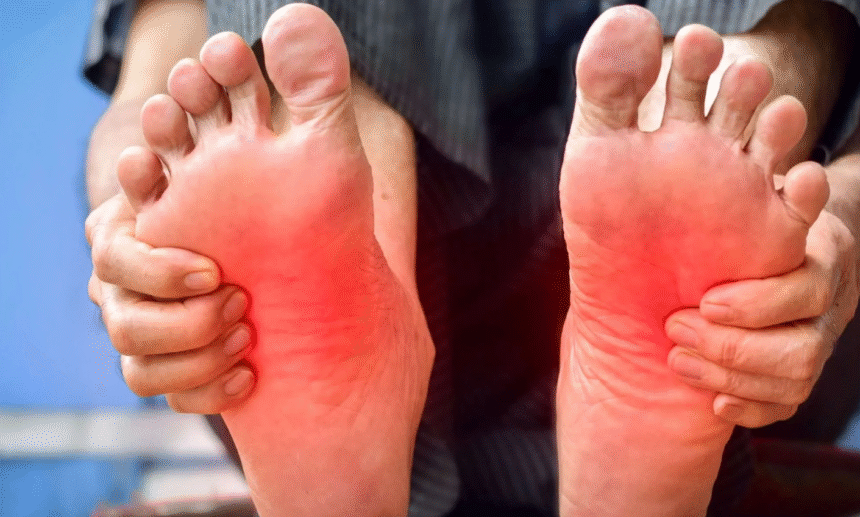Exercise and Physical Activity
Exercise is super important for dealing with neuropathy. It gets your blood flowing, strengthens your muscles, and helps your nerves work better. Regular exercise can actually make those neuropathy symptoms feel less intense and boost how you feel overall. Let’s look at how to get moving.
It’s not just about hitting the gym. Finding ways to move more every day can make a big difference. Think about it: more movement, less pain.
Benefits of Regular Exercise
Regular exercise does a body good. It’s not just about looking good; it’s about feeling good, especially when you’re dealing with neuropathy.
Exercise helps improve blood flow, which is key for nerve health. Plus, it can make your muscles stronger, which helps with balance and coordination. And who doesn’t want a little mood boost?
Think of exercise as medicine. It’s a natural way to ease pain and improve your quality of life.
Types of Recommended Exercises
Not all exercises are created equal, especially with neuropathy. You want to focus on things that are gentle on your body but still effective.
Low-impact aerobic exercises like walking, swimming, or cycling are great. They get your heart pumping without putting too much stress on your joints. Strength training is also important for stability.
Flexibility exercises like yoga or tai chi can help with stiffness. Balance exercises, like standing on one foot, can reduce the risk of falls. It’s all about finding what works for you.
Incorporating Movement into Daily Life
Staying active doesn’t always mean hitting the gym. It’s about finding ways to move more throughout your day.
Think about simple things like gardening, doing household chores, or even dancing. These activities can add up and make a big difference. The key is to find something you enjoy so you’ll stick with it.
Here are some ideas:
- Take the stairs instead of the elevator.
- Park further away from the store.
- Go for a walk during your lunch break.
Balanced Diet and Nutrition
Importance of Nutrient-Rich Foods
A balanced diet is super important. It’s not just about weight; it’s about nerve health. Nutrient-rich foods can really make a difference in managing neuropathy symptoms.
Think of food as medicine. What you eat directly impacts how your nerves function and feel.
Focus on getting a variety of vitamins and minerals.
Foods to Avoid for Nerve Health
Some foods can make neuropathy worse. Processed foods are a big no-no. They often contain additives that can irritate nerves.
Refined sugars are another culprit. They can cause inflammation, which is bad for nerve health.
It’s best to limit alcohol and caffeine. These substances can interfere with nerve function and exacerbate symptoms.
Hydration and Its Role in Neuropathy
Staying hydrated is key for overall health, including nerve function. Water helps maintain proper nerve signaling. Dehydration can worsen neuropathy symptoms.
Aim for at least eight glasses of water a day. This helps keep your nerves happy and healthy.
Consider adding electrolytes. They can help with nerve function, especially if you’re active.
Stress Management Techniques
Stress can really mess with neuropathy. It’s like throwing fuel on a fire. Learning to handle stress better can make a real difference in how you feel day to day. It’s not a cure, but it can help manage the symptoms.
Stress isn’t just in your head; it affects your whole body. When you’re stressed, your body releases chemicals that can make nerve pain worse. Finding ways to relax can actually calm those nerves down. It’s all connected, really.
So, what can you do? There are lots of options, and what works for one person might not work for another. The key is to find something that you enjoy and that helps you unwind. Don’t be afraid to experiment a little.
Mindfulness and Meditation
Mindfulness is about paying attention to the present moment. It’s about noticing your thoughts and feelings without judging them. Meditation is a tool to help you practice mindfulness.
It’s like giving your brain a little vacation. You don’t have to sit cross-legged and chant (unless you want to!). There are apps and guided meditations that can make it easier to get started. Even a few minutes a day can make a difference.
Mindfulness can help you become more aware of your body’s signals. This can be especially helpful with neuropathy, as you can learn to recognize when your symptoms are getting worse and take steps to manage them.
Breathing Exercises
Breathing exercises are a simple and effective way to calm your nervous system. When you’re stressed, your breathing becomes shallow and rapid. Deep breathing can help slow your heart rate and lower your blood pressure.
There are many different types of breathing exercises. One popular technique is called diaphragmatic breathing. This involves breathing deeply from your belly, rather than your chest. It can help you feel more relaxed and grounded.
Try this: Sit comfortably, close your eyes, and place one hand on your chest and the other on your belly. Inhale slowly through your nose, feeling your belly rise. Exhale slowly through your mouth, feeling your belly fall. Repeat for a few minutes.
The Role of Sleep in Stress Reduction
Sleep is super important for managing stress and neuropathy symptoms. When you don’t get enough sleep, your body is less able to cope with stress. This can make your nerve pain feel even worse.
Aim for 7-8 hours of sleep per night. Create a relaxing bedtime routine to help you wind down before bed. Avoid caffeine and alcohol before bed, and make sure your bedroom is dark, quiet, and cool.
Good sleep hygiene can make a big difference in how you feel. It’s not always easy to get a good night’s sleep when you’re in pain, but it’s worth the effort. Prioritize sleep, and your nerves will thank you.
Avoiding Harmful Substances

Impact of Alcohol on Nerve Health
Alcohol and neuropathy? Not a good mix. Excessive drinking can directly damage nerves. It’s like pouring gasoline on a small fire – makes things way worse.
Think of your nerves as delicate wires. Alcohol strips away their protective coating. This leads to pain, numbness, and weakness.
Moderation is key. If you have neuropathy, talk to your doctor about alcohol. They can give you personalized advice.
Effects of Smoking on Neuropathy
Smoking is bad news, period. It constricts blood vessels, reducing blood flow. Nerves need blood to thrive, so this is a problem.
Nicotine messes with circulation. This starves the nerves of oxygen and nutrients. The result? Worsened neuropathy symptoms.
Quitting smoking is one of the best things you can do. It helps improve blood flow and nerve health. Your body will thank you.
Managing Caffeine Intake
Caffeine: a double-edged sword. It can perk you up, but also overstimulate nerves. This can lead to increased pain and discomfort.
Too much caffeine can make you jittery. It can also interfere with sleep, which is crucial for nerve repair. Finding the right balance is important.
Try cutting back on coffee, tea, and energy drinks. See if it makes a difference in your symptoms. Everyone reacts differently.
Foot Care and Protection
Daily Foot Inspections
Daily foot inspections are super important. Look for cuts, blisters, redness, or swelling. Catching problems early can prevent serious issues, especially with Neuropathy Treatment.
Make it a habit. Use a mirror if needed to see the bottoms of your feet. Report anything unusual to your doctor right away.
Don’t skip this step. It’s a simple way to protect your feet.
Choosing the Right Footwear
Footwear matters a lot. Pick shoes that fit well and offer good support. Avoid tight shoes that can cause pressure points.
Consider shoes with wide toe boxes. Breathable materials are also a plus. Good shoes can make a big difference in comfort and preventing injuries.
Proper footwear is key to preventing foot problems. Ill-fitting shoes can lead to ulcers and infections, especially if you have neuropathy.
Preventing Injuries and Infections
Preventing injuries is crucial. Always wear shoes, even indoors. Be careful of hot surfaces and sharp objects.
Keep your feet clean and dry. Moisturize regularly, but avoid putting lotion between your toes. This helps prevent fungal infections.
If you notice any signs of infection, see a doctor immediately. Early Neuropathy Treatment is essential to avoid complications.
Support Systems and Professional Guidance
The Role of Healthcare Providers
Healthcare providers are key. They can diagnose and manage neuropathy. Regular check-ups are important.
They can also help with pain management. Doctors can prescribe medications. They can also suggest therapies.
Don’t hesitate to ask questions. A good doctor will listen. They will also explain things clearly.
Benefits of Support Groups
Support groups offer a safe space. People can share experiences. It helps to know you’re not alone.
These groups can reduce isolation. They also provide emotional support. You can learn coping strategies from others.
Finding a local group can be easy. Online groups are also available. Look for one that fits your needs.
Integrating Therapies into Treatment Plans
Treatment plans should be comprehensive. This means combining different therapies. It could include medication and lifestyle changes.
Physical therapy can help with movement. Occupational therapy can improve daily tasks. Support systems are also important.
A well-rounded approach is best. It addresses all aspects of neuropathy. This leads to better outcomes.
Monitoring and Tracking Symptoms

Keeping a Symptom Diary
It’s a good idea to keep tabs on how you’re feeling. A symptom diary can be a game-changer. Jot down when symptoms flare, what seems to trigger them, and how intense they get.
This helps you and your doctor spot patterns. Tracking your progress can also show what lifestyle tweaks are actually making a difference.
A symptom diary doesn’t need to be fancy. Just a simple notebook where you can record your daily experiences with neuropathy.
Using Technology for Tracking
Apps and gadgets can make tracking symptoms easier. There are apps designed for pain management. Some fitness trackers can monitor activity levels and sleep patterns.
These tools can provide data to share with your healthcare team. They can also help you stay motivated and engaged in your care.
Consider these options:
- Smartphone apps for pain tracking
- Wearable fitness trackers
- Digital sleep monitors
When to Seek Professional Help
Don’t hesitate to reach out to a doctor if things change. Sudden worsening of symptoms is a red flag. New symptoms should also be checked out.
Regular check-ins with your healthcare provider are key. They can adjust your treatment plan as needed. They can also offer guidance on managing your condition effectively.
It’s always better to be safe than sorry. If you’re unsure, get it checked out.
Wrapping It Up
In summary, managing neuropathy symptoms can be a tough journey, but making some lifestyle changes can really help. Things like eating better, staying active, and managing stress can make a noticeable difference. It’s not just about feeling better; these changes can also help prevent further nerve damage. If you or someone you know is dealing with neuropathy, it’s worth talking to a healthcare provider about a plan that fits your needs. Remember, small steps can lead to big improvements in your daily life.














